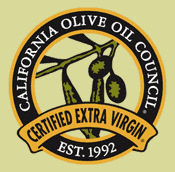 A turnout larger than the California Olive Oil Council (COOC) has seen in years gathered Saturday, March 5 in Monterey for the organization’s annual meeting. It wasn’t the numbers alone, however, that made the event a success. The energy and enthusiasm were high as members participated in a dynamic program of events, including seminars and a trade show complete with an olive oil competition. Certainly, the election of six open board seats contributed to the attendance and definitely stirred the excitement as well.
A turnout larger than the California Olive Oil Council (COOC) has seen in years gathered Saturday, March 5 in Monterey for the organization’s annual meeting. It wasn’t the numbers alone, however, that made the event a success. The energy and enthusiasm were high as members participated in a dynamic program of events, including seminars and a trade show complete with an olive oil competition. Certainly, the election of six open board seats contributed to the attendance and definitely stirred the excitement as well.
The increase in attendance came as no surprise to Patty Darragh, executive director of the COOC, who estimated the meeting turnout was 30 percent higher than last year and Saturday night’s dinner guests topped last year’s by 40 percent. “The numbers are huge,” she said with audible excitement. Darragh attributed the numbers to the overall growth of the industry as well as the new USDA Standards and the recent UC Davis Reports which she said got people in the industry very excited. She also credited the COOC’s increased outreach and membership drive, as well as the success of California growers and producers.
This year’s election was laced with anticipation of members eager for a COOC that will work for them and adapt to the remarkable changes brought by the huge growth of California’s olive oil industry. In its nineteenth year of service, the COOC has experienced its own changes in leadership, membership and responsibilities. Some members cast their votes a bit more purposefully than in years past, with an eye toward their future in an industry that, with strong advocacy, will take them far.
One attendee told Olive Oil Times that the “unprecedented level of interest in the election,” as well as the energy and excitement at the meeting, were due to the names on the ballot. Several attendees, including some founding members, who had left the organization some years ago, have recently renewed their membership, marking a shift that clearly contributed to the excitement of the election, and the entire meeting.
The election is held every year at the annual meeting. Members rotate off the 13-member board each year as their two-year term ends. There is no limit to the number of times incumbents may seek reelection. COOC members cast their votes to fill the open seats, choosing from incumbents and the new candidates. One attendee called the election procedures “less than stellar.” However, for the first time, candidates were given the opportunity to address the membership. The notification was apparently a bit last minute, but every challenger either spoke or had a statement read for them if they were not present.
A prominent force behind California Olive Oil, Deborah Rogers, managing co-owner of The Olive Press, was running for a seat on the board. One of the original members of the COOC, she recently returned in what she describes as “this surge of awareness in California olive oil” which she connected to the USDA standards, the UC Davis report, and what’s happening globally, such as in Australia. “They’re new world, aggressive in marketing and getting higher standards,” she said of Australia. “I want us to be doing the same thing.” Rogers believes in the foundation of the COOC and said she was “loaded with all of these ideas to make some really positive changes.” She would like to see the election outcome in favor of the new candidates, to hopefully make a diversified board of growers, producers, retailers, and marketers. “There are incredible opportunities along with some real challenges that the California olive oil industry faces,” said Rogers, “I want to be a part of it.”
 “We’re seeing an organization at a crossroads,” says Adam Englehardt of the COOC. Englehardt is a twelve-year COOC member and vice president of orchard services for California Olive Ranch. He’s been trying to get more growers and large producers on the COOC board, which, he says would be “a step in the right direction” because the needs of both small and large producers need to be met.
“We’re seeing an organization at a crossroads,” says Adam Englehardt of the COOC. Englehardt is a twelve-year COOC member and vice president of orchard services for California Olive Ranch. He’s been trying to get more growers and large producers on the COOC board, which, he says would be “a step in the right direction” because the needs of both small and large producers need to be met.
Englehardt explained that the COOC has been more of “a producers’ advocacy group, but as the industry gets larger, larger producers want the COOC to be more of a growers’ advocacy group in terms of standards.” Though he acknowledges that the needs of the small and large producer — high quality and strict standards that are enforced — are the same, the differences arise in profitability. Large growers are “heavily invested in the olive industry,” he said, which is different from a smaller producer who does it on the side or in retirement. There’s a social orientation to much of what the COOC is doing like tastings and competitions. When profits are at stake, members want the COOC to be more of a commodity with active legislation, enforcement, and advertising. It needs to be aggressive.
Though the election buzz was felt throughout the event, it by no means diminished the interest and participation in the highly relevant and valuable program. Between Friday evening’s reception and dinner Saturday, were a trade show, tasting bar and olive oil competition, and well-attended seminars. Englehardt led a seminar in two well-attended sessions on the effects of frost and freeze on the olive crop which he hopes will make growers aware of the vital need to manage their risk. Dan Flynn, director of the UC Davis Olive Center, moderated a conversation between Paul Miller of the Australian Olive Association, Selina Wang of UCD, and Bruce Golino of Santa Cruz Olive Tree Nursery about the science and politics of olive oil standards. Other seminars included organic certification, how to be your own publicist and the standing-room-only presentation on olive oil food pairings. Susan Boyd appeared on behalf of California Senator Lois Wolk, newly appointed chair of the Senate Subcommittee on Olive Oil Production and Emerging Products.
 Bob Singletary was given the council’s Pioneer Award. “He is a truly wonderful, utterly unassuming man, who has been making olive oil in California as long as almost anyone”, Alexandra Devarenne said of Mr. Singleton in an email, adding “I was absolutely thrilled that Bob was acknowledged for his contribution.”
Bob Singletary was given the council’s Pioneer Award. “He is a truly wonderful, utterly unassuming man, who has been making olive oil in California as long as almost anyone”, Alexandra Devarenne said of Mr. Singleton in an email, adding “I was absolutely thrilled that Bob was acknowledged for his contribution.”
This year’s annual meeting of the council and its members reflected the energy of California’s growing, thriving, and changing olive oil industry. With a strong and effective COOC, California will continue to charge forward with that unbridled passion and talent that has brought it to this very exciting place.


